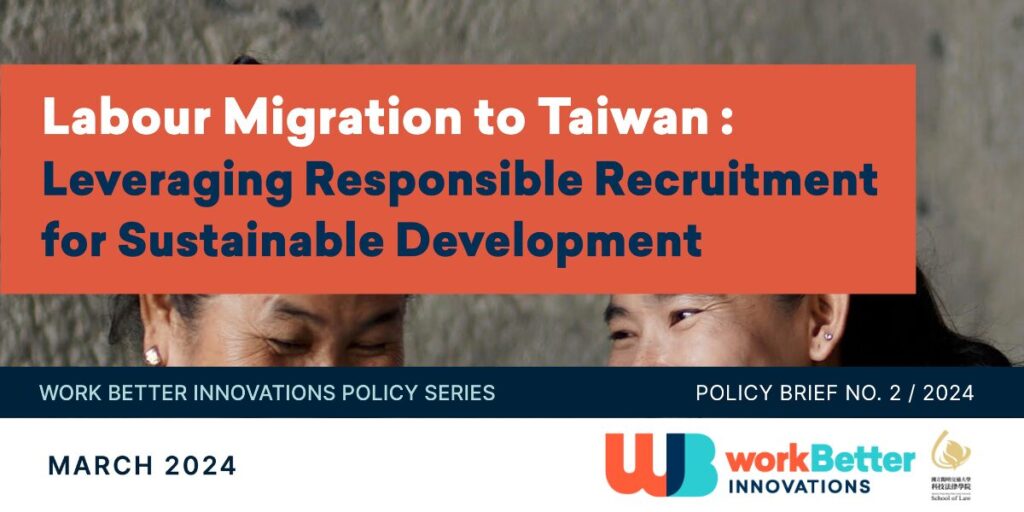Policy Brief No. 2 / 2024 (March 2024) 政策摘要編號 2 / 2024 (2024年3月)
This policy brief, “Labour Migration to Taiwan: Leveraging Responsible Recruitment for Sustainable Development,” outlines the contributions that migrant workers in Taiwan make to sustainable development outcomes in their countries of origin via remittances. It also discusses loss or delay of positive development outcomes owing to Taiwan’s flawed labour recruitment system.
You can read it online in full screen mode or download the PDF.
這份摘要《台灣移工責任聘僱與追求永續發展》討論在台的移工如何貢獻原籍國的永續發展,也探討在不完善的招聘制度中,因移工必須承擔跨國招聘費和在台就業的相關費用,阻礙或延遲這些發展效益。
您可以在線上閱讀全螢幕模式或者下載PDF檔.
This policy brief, “Labour Migration to Taiwan: Leveraging Responsible Recruitment for Sustainable Development,” outlines the important contributions that migrant workers in Taiwan make to sustainable development outcomes in their countries of origin via remittances. These positive development outcomes are particularly seen in:
- Higher household income;
- Increased access to housing;
- Promote quality education;
- Remittances as support during crisis; and
- Supporting entrepreneurship.
As well as discussing the economic benefits of remittances sent by migrant workers in Taiwan, this policy brief also addresses the associated loss or delay of positive development outcome due to Taiwan’s flawed labour recruitment system, where migrant workers bear their recruitment fees and related costs of their job placement in Taiwan.
This Policy Brief also features two stories of Indonesian migrant workers in Taiwan contributed by the Indonesian journalist Randy Mulyanto. Their stories frame these remittance statistics on the lived experiences of migration to illustrate the costs associated with migrant workers’ employment in Taiwan, as well as the benefits of their remitted earnings.
For clarity on the terms of labour recruitment as used in Taiwan, we suggest for this brief to be read in conjunction with Work Better Innovations Policy Brief No. 1 / 2023, released in December 2023, as an English-Chinese terminology “dictionary” of recruitment fees and related costs in Taiwan.
The research, authored by Shuhan Lin and Dr. Bonny Ling, is the second study with the Taiwan Project for Business and Human Rights, a special collaboration between WBI and Professor Yu-Fan Chiu, from the leading School of Law, National Yang Ming Chiao Tung University in Taiwan.
Sustainable development is fundamentally about people’s ability to thrive: lead a long and healthy life, have access to education, and a decent standard of living. This policy brief concludes that the Employer Pays Principle where “no worker should pay for a job [where] the costs of recruitment should be borne not by the worker but by the employer” must take root in Taiwan.
* * *
這份摘要,《台灣移工責任聘僱與追求永續發展》,由林姝函和凌怡華博士主筆,是「台灣企業人權方案」第二份出版品。
摘要列舉了移工的薪資匯款貢獻家鄉的下述發展:
- 提升家戶所得
- 提高擁有住房的比例
- 推動優質教育
- 平穩經濟危機或天然災害
- 支持創業
我們同時也論述在不完善的招聘制度中,因移工必須承擔跨國招聘費和在台就業的相關費用,阻礙或延遲這些發展效益。
感謝印尼記者 Randy Mulyanto 的幫忙,這份摘要收錄了兩位在台印尼移工的故事,讓統計數字交互印證人的生命經驗,從他們在台就業的失、和遠在印尼家庭的得。
建議您搭配閱讀我們在去年出版的政策摘要編號 1 / 2023,以釐清招聘費和相關費用的中英術語和差異。
永續發展的核心在於每個人都能成長茁壯,包含生活健康而長壽、能有接受教育的機會和合理的生活水準,這同時仰賴我們在這份摘要的總結:任何招聘費或相關支出都不應向勞工支付、讓「雇主支付原則」在臺生根。

“很開心終於有一份聚焦在台移工發展貢獻的研究。在撰寫時,發現這是一項被台灣忽略的議題,而同樣是重要但也被忽略的,是在勞務移動中,真正的核心是人、而不是只有勞力。希望這份研究而帶來實質的改變。“
“Glad to have an analysis focusing on the contributions of migrant workers in Taiwan to human development, in concrete statistics and in stories. The topic has long been overlooked. Ultimately human beings in pursuit of decent living are the essence of labour migration but not the labour force alone. I hope this policy brief will bring substantial change.“
– 林姝函 Shuhan Lin


